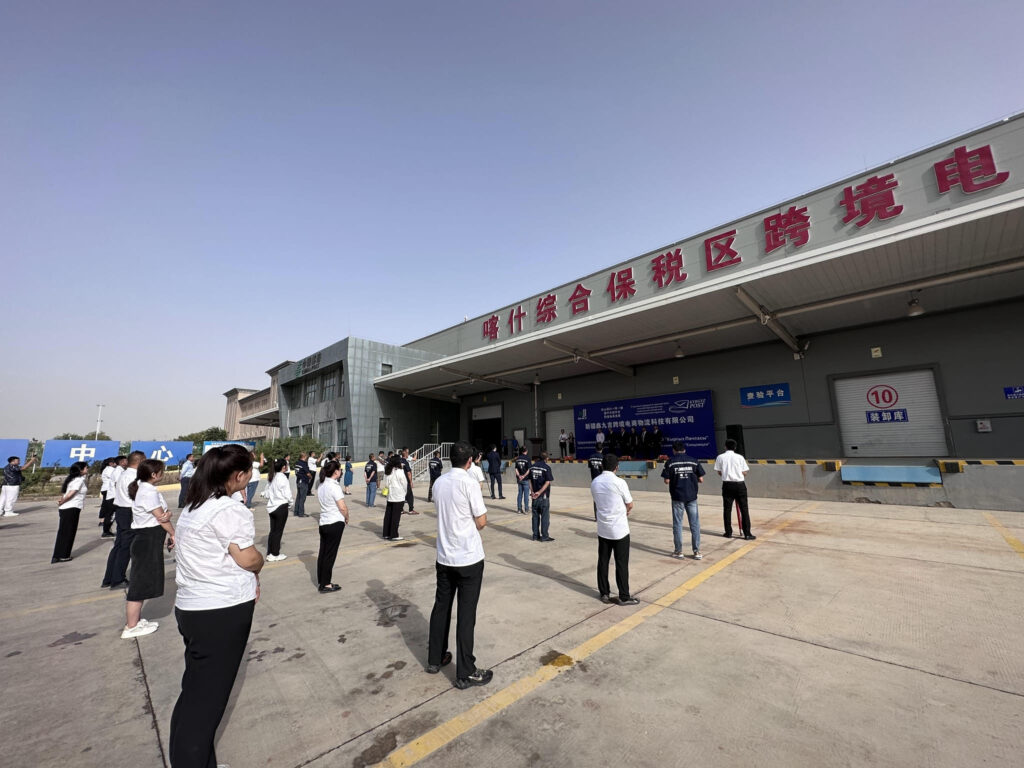Kyrgyzstan and China have agreed on an extraterritorial arrangement designed ostensibly to facilitate trade in consumer goods. But a lack of details about the arrangement raises questions about the scope of its operations.
Kyrgyzstan’s Ministry of Digital Development issued a brief statement on August 23 announcing the opening of a representative office of Kyrgyz Post in Kashgar, an economic hub in China’s westernmost Xinjiang Province. The office will operate under the auspices of China Post’s International Postal Exchange in Kashgar’s Special Economic Zone. The ministry statement did not provide specifics on what functions Kyrgyz postal service representatives in Kashgar will perform, while asserting the move will improve “postal infrastructure” and promote bilateral trade.
“It [the representative office] will play a special role in facilitating cross-border e-commerce and will create new opportunities for effective interaction between business and consumers,” the statement said.
The volume of e-commerce between China and Central Asian states remains comparatively low but has grown since 2020, when the covid pandemic caused a spike in online shopping. Earlier this summer, the first truckload of e-commerce goods completed the journey from Kashgar across the Kyrgyz border under a customs regime known as TIR, according to a news release issued by the World Transport Organization (IRU). TIR aims to reduce transit times via the shipment of goods in “sealed load compartments controlled by customs in a multilateral, mutually recognized manner,” the IRU says.
Kyrgyz officials are intent on expanding e-commerce exports to China. In mid-August, Kyrgyz officials signed a memorandum of understanding with representatives of Alibaba, the Chinese e-commerce giant, outlining steps to expand the presence of Kyrgyz sellers on the platform. A statement issued by Kyrgyzstan’s Chamber of Commerce and Industry said Alibaba’s commitment “could be of great importance for the development of e-commerce and delivery infrastructure in the region.”
The timing of the Kyrgyz-Alibaba initiative is not exactly propitious. Consumer spending in China is cratering due to a combination of negativeeconomictrends, including high youth unemployment, mounting state debt, a bursting real estate bubble and plummeting consumer confidence fueled by fears of deflation. Under the circumstances, even with a big boost from Alibaba, Kyrgyz sellers will likely be challenged to carve out markets in China for the foreseeable future.
The relatively low volume of existing e-commerce-related traffic, along with the likelihood that demand will remain weak for a while, raises questions about the utility of Kyrgyz Post representative office in Kashgar: the timing of the move does not appear to match a current need. Why should Kyrgyzstan, a cash-strapped Central Asian nation, go to the expense of opening a foreign outpost that does not appear economically justifiable?
The location of the Kyrgyz Post office provides a clue about potential additional functions. Kashgar is situated near Kizilsu Kyrgyz Autonomous Prefecture, the nominal homeland for China’s roughly 160,000 ethnic Kyrgyz population. Kashgar is also one of the largest cities in Xinjiang, the epicenter of a comprehensive crackdown on China’s restive Muslim minority groups. It seems possible, then, that in addition to fostering e-commerce activity, the Kyrgyz representative office could facilitate efforts by Chinese officials to keep tabs on mail and electronic communications between Kyrgyz on both sides of the border.
The announcement about the Kyrgyz Post representative office in Kashgar came shortly after Kyrgyz Prime Minister Akylbek Japarov made a trip to Xinjiang in mid-August, during which he held talks with regional officials and signed several economic agreements. In June, a Kyrgyz Interior Ministry delegation signed an array of agreements on boosting security cooperation at the conclusion of a Xinjiang visit. An Interior Ministry statement noted that Kyrgyz security officials while in Xinjiang had opportunities “to study new achievements in the digitalization of the Chinese police.”
Source : EURASIANET


